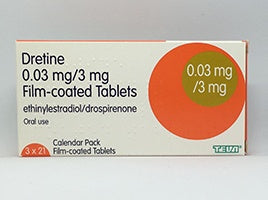Dretine


Dretine is a combined contraception pill that is used to prevent pregnancy. This is a 21-day tablet that contains two female hormones, drospirenone and ethinylestradiol.
Dretine as a Contraception
Dretine is a combination birth control pill that works to prevent pregnancy and regulate menstruation symptoms while reducing monthly bleeding. Dretine is taken consecutively for 21 days with a seven-day break.
What is Dretine and how does it work?
The Dretine pill contains only the progestogens usually found in contraceptive pills, the two female hormones: drospirenone and ethinylestradiol.
These hormones work to ensure a sperm cell does not reach an egg by thickening the cervical mucus, thinning the lining of the womb and preventing the ovaries from releasing an egg each month.
Is Dretine right for me?
If you are looking for an effective oral contraceptive, Dretine may be right for you. However, it may not be suitable for you if you have the following:
All medications can cause potential side effects, below we have listed some potential side effects of Dretine. However, these do not always occur and are mostly mild in nature. But if you experience any prolonged or worrying side effects of Dretine, please discontinue the medication immediately and consult your doctor.
Common side effects include:
Always take Dretine exactly as prescribed by your doctor or advised by the pharmacist.
Dretin may not be safe if taken with other medication or recreational drugs. Please inform the prescriber if you are taking any of the listed medications.
DO NOT take Dretin:
To view Dretine Patient Leaflet click here.
To view PDF patient leaflet click here.
Dretine is a combined oral contraceptive pill that contains the hormones ethinylestradiol and drospirenone. It is used to prevent pregnancy. Dretine can also be used to treat the premenstrual dysphoric disorder (PMDD) and moderate acne in women who are at least 14 years old. It is not known whether Dretine is safe to use during pregnancy. Therefore, it should not be taken if you are pregnant or think you may be pregnant.
Some of the common side effects of Dretine include headache, nausea, breast tenderness, and spotting between periods. Less common side effects include mood changes, depression, bloating, and changes in sex drive. You should stop taking Dretine and see your doctor if you experience any of these side effects. Dretine is not recommended for use by women who are over 35 years old or who have a history of blood clots.
Dretine is usually taken once a day, at the same time each day. You should take Dretine for as long as your doctor recommends. If you forget to take a dose of Dretine, take it as soon as you remember (even if it means taking 2 pills together). A missed pill is one that is 24 or more hours late. Please see the patient information leaflet or speak to a healthcare professional for specific advise about a missed pill. When used correctly, Dretine can be over 99% effective at preventing pregnancy.
If you are interested in using Dretine to prevent pregnancy, talk to your doctor. They can help you decide if Dretine is the right contraceptive for you.
The information provided in this blog post is intended for general informational purposes only and should not be considered as medical advice, diagnosis, or treatment. Welzo does not endorse or sell the medication discussed, nor do we recommend using this information as a substitute for professional healthcare. Always consult with a qualified healthcare provider before making any decisions regarding your health or medical treatment. Welzo assumes no responsibility for any actions taken based on the information provided in this blog.








Plus get the inside scoop on our latest content and updates in our monthly newsletter.